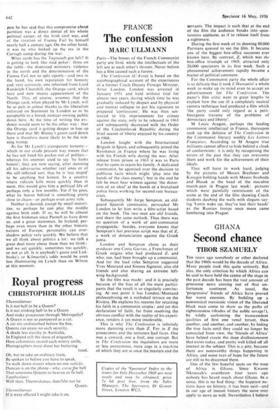FRANCE
The confession
MARC ULLMANN
Paris—The bosses of the French Communist party are livid, while the intellectuals of the left are at each other's throats. Never before has a film caused such a furore.
The Confession (L'Aveu) is based on the autobiographical account of the experiences
of a former Czech Deputy Foreign Minister, Artur London. London was arrested in January 1951 and held without trial for almost two years, during which time he was gradually induced by despair and by physical and mental collapse to put his signature to
prepared 'confessions'. He was then sen-
tenced to life imprisonment for crimes against the state, only to be released in 1963 and subsequently decorated with the Order of the Czechoslovak Republic during the brief season of liberty enjoyed by his country in 1968.
London fought with the International Brigade in Spain, and subsequently joined the Resistance ,in France where he was living with his French wife during the war. After release from prison in 1963 it was to Paris that he came to rejoin his family. A dedicated communist, he agonised over the decision to publicise facts which might 'play into the hands of the class enemy'; but in the end he felt he must bear witness against 'the distor- tion of an ideal' at the hands of a brutalised police force working for second-rate bureau- crats.
Subsequently Mr Jorge Semprun, an old- guard Spanish communist, persuaded Mr London to let him write a film-script based on the book. The two men are old friends, and share the same outlook. Thus there was
no question of a work of anti-communist propaganda : besides, everyone knows that Semprun's last previous script was that of Z, a work of denunciation against the Greek junta.
London and Semprun chose as their producer one Costa Gavras, a Frenchman of Greek origins who had produced Z, and who, too, had been brought up a communist. And for the lead roles Semprun suggested Yves Montand and Simore Signoret, also old friends and also sharing an extreme left- wing background.
So the film was made: and it is precisely because of the bias of all the main partici- pants that the result is so singularly convinc- ing. At one point it has London/ Montand philosophising on a sunbaked terrace on the Riviera. He explains his reasons for retaining his faith in a communist utopia: and yet this declaration of faith, far from resolving the obvious conflict with the reality of his experi- ence, renders it yet more intolerable.
This is why The Confession is infinitely more damning even than Z. For in Z the
prosecutors and the torturers had faces. One
was a coward, one a fool, one corrupt. But in The Confession the Inquisitors are more
or less anonymoui, mere cogs in a machine of which they are at once the masters and the servants. The impact is such that at the end of the film the audience breaks into spon- taneous applause, as if to release itself from a nightmare.
During the first week of its showing 80,000 Parisians queued to see the film. It became one of the biggest box-office successes ever known here. By contrast, Z, which was the box-office triumph of 1969, attracted only 20,000 spectators in its first week. Such a phenomenal achievement rapidly became a matter of political comment.
For the Communist party the whole affair is so delicate that it took L'Humanite a whole week to make up its mind even to accept an advertisement for The Confession. The paper's film critic went to great lengths to explain how the use of a completely neutral camera technique had produced a film which 'the party could only regard as a petit- bourgeois travesty of the problems of democracy and liberty'.
M Louis Aragon, perhaps the leading communist intellectual in France, thereupon took up the defence of The Confession in the Communist literary weekly Les Lettres Francaises. According to M Aragon true militants cannot afford to hide behind a cloak of conformism: it is only by recognising the errors of the past that they can overcome them and work for the achievement of their ideals.
They will have to work hard, judging by the pictures of Messrs Brezhnev and Kosygin holding hands with Messrs Svoboda and Husak at the head of the macabre march-past in Prague last week : pictures which were painfully reminiscent of the scene at the end of the film showing Czech students daubing the walls with slogans say- ing 'Lenin wake up, they've lost their heads' as the Russian troops • once more came lumbering into Prague.


































 Previous page
Previous page